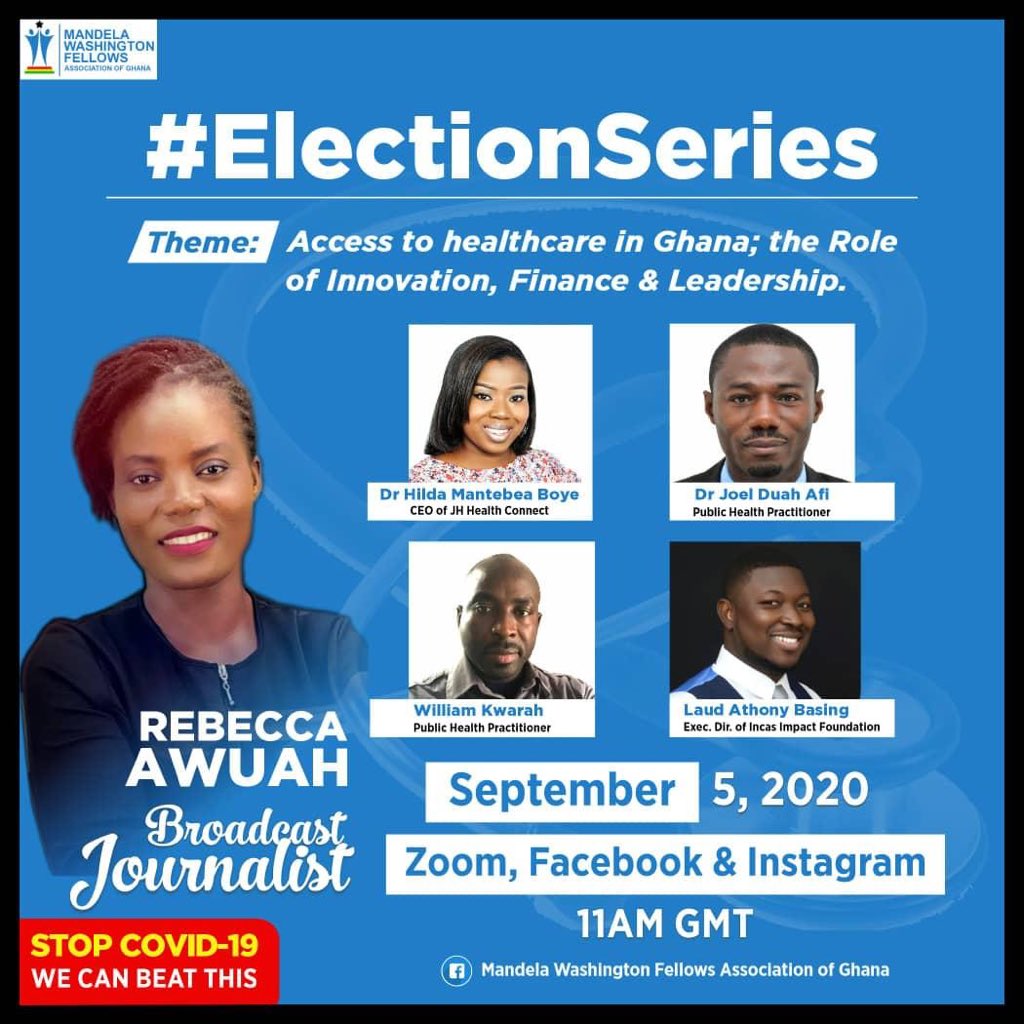The COVID 19 pandemic exposed a raft of deficiencies with Ghana’s healthcare system.
Assembling the giants in the health sector to share their experiences revealed the depth of the challenge with the country’s access to healthcare. Under-resourced laboratories, neglected rural health facilities and poor access to healthcare were among the few major issues that dominated the maiden edition of the #ElectionSeries held virtually by the Mandela Washington Fellowship Association of Ghana (MWFAG) on 5th September, 2020.
CEO INCAS Diagnostics and 2016 Mandela Washington Fellow, Dr Laud Anthony Basing sharing personal experience on the state of medical laboratories in Ghana, said many laboratories don’t have the capacity to run proper tests. “Unfortunately, most of these labs can do 55 percent of what global standards demand. Forty-five percent of the private labs that conduct tests for public hospitals, you cannot vouch for their results,” he added.
Dr. Basing attributed the challenge to the low budgetary allocation made to laboratories. He explained that in 2004, there were 1.4 million tests with an average of cost GHc50, stressing the point that laboratories are neglected despite the money they make for health facilities. According to him, despite the significant role labs play in healthcare system, they are poorly under-funded. Dr Basing stressed that the country is interested in importing the medical reagents laboratories use, but, are not interested in manufacturing it when there is human resource to do it. “When you look at Noguchi and KCCR, these centres should have been at the forefront of the covid fight, they are supposed to lead research for vaccines and treatment, but, they are rather testing,” he observed. Speaking on ‘Access to healthcare: role of innovation and technology’, Public Health Specialist with focus in data analytics, Williams Kwarah, noted that it’s a complex topic given how many people view the subject of access. According to him, access is the timely use of personal health services to achieve the best possible outcomes. Mr. Kwarah observed that OPD attendance in recent times has witnessed an increase because of the national health insurance scheme, NHIS. “When you look at the data from 2014 to 2020, you would notice that 80 percent of patients under the NHIS have been accessing healthcare,” he added.
He said from 2016 to 2020, home visits by health officials at CHPS compound have witnessed a significant decrease. The public health specialist questioned whether the right information is being provided by health officials to the community. He disclosed that a number of NHIS subscribers are not able to access quality healthcare services. He questioned whether there is equity in access to healthcare between urban and rural centres even though mortality rate for children under five is witnessing a decrease. On life expectancy, Mr. Kwarah said women are living longer than men adding that “Ghana isn’t doing badly on the global scale”.
Head of Research at IMANI Africa and 2019 Mandela Washington Fellow, Patrick Stephenson on his part noted that the #ElectionSeries was inspired to give voices to young leaders from the fellowship to make an input on the various sectors ahead of the December polls. Touching on the maiden edition which focused access to healthcare in ghana during the era covid 19, he explained that investment in healthcare has been relatively. “Investment in healthcare is a little less than 0.1 percent of the GDP. It was only pushed to over 1.1 of the country’s GDP which represents an amount of 16 billion cedis due to the challenges we are faced with,” he pointed out.
He added that the #ElectionSeries is meant to draw the attention of duty bearers to the gaps in the key sectors of the economy for remedial action.
2019 Mandela Washington Fellow and acting Medical Superintendent in the Asunafo North, Joel Afi, said the NHIS came to provide access to healthcare. According to him, about 10 million people have subscribed to the NHIS. He pointed out there is significant percent of rural folks are not covered under the NHIS because they don’t have the financial access to pay their subscription. Dr Afi stressed that once we are looking at access to healthcare services, the rural areas and hard to reach communities are sidelined in the equation.
Speaking on leadership in the health sector, Specialist Pediatrician with the child health department of the Korle Bu teaching hospital, Dr Hilda Boye, said the visually and hearing impaired groups tend to have a challenge with access to healthcare. She pointed out that persons with disability continue to face barriers including how hospitals have been structurally designed. She called on training on sign language experts to ensure confidentiality when those with hearing impairment visit the hospital.
Story: Kwetey Nartey
